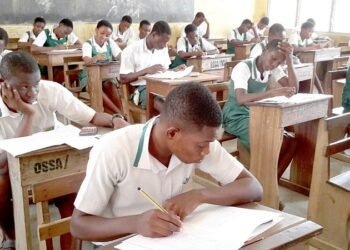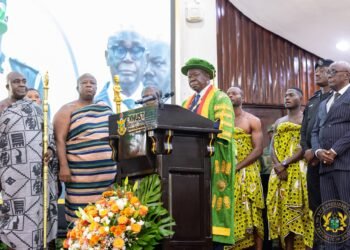Kofi Asare, the Executive Director of Africa Education Watch, has highlighted serious concerns regarding the significant debts owed by the Government of Ghana (GoG) to the West Africa Examination Council (WAEC).
In a detailed account, Mr Asare indicated that the total debt, amounting to approximately GHC 340 million, has been accumulating since 2022 and pertains to the registration fees for the Basic Education Certificate Examination (BECE) and the West African Senior School Certificate Examination (WASSCE).
He stated that the government currently covers the full cost of BECE and WASSCE registration as part of the Free Senior High School (SHS) policy for public school students while private school students pay their fees directly and are not part of this debt.
Highlighting the most critical issues, the Executive Director for the education think-tank group, Africa Education Watch asserted that the huge debts can impact the West Africa Examination Council’s ability to conduct credible examinations.
Mr Asare stated that the quality of invigilation and supervision is crucial and heavily dependent on adequate funding, adding that poor invigilation and supervision create opportunities for widespread exam collusion and fraud, particularly in the West Africa Secondary School Certificate Examination (WASSCE).
“Eduwatch has been recommending the use of non-GES staff as exam invigilators and supervisors. Without any disrespect, I surmise that, with the current erratic budgetary regime, WAEC can only continue to engage GES staff or public sector employees because they are actually used to being owed by WAEC due to the long-standing relationship”.
Kofi Asare, Africa Education Watch Executive Director

Funding Public Examination
In light of ongoing financial challenges, Mr Asare questioned the economic rationale behind funding the West Africa Secondary School Certificate Examination for all students, regardless of their financial background.
With a registration fee of GHC 465 per candidate, Mr Asare disclosed that the government is spending nearly GHC 180 million on the free West Africa Secondary School Certificate Examination this year.
According to him, the government is incurring this expenditure at a time when some senior high school students are learning in substandard conditions, such as cooking under makeshift sheds and lacking basic facilities like beds and desks.
“Amid these perennial financing challenges, and other pressing financing needs in the infrastructure and TLR space, does it make economic sense to keep paying for WASSCE for the rich and poor or we will keep making excuses under the guise of ‘we can’t determine who can pay’?”
Kofi Asare, Africa Education Watch Executive Director
In a fervent call to action, the Africa Education Watch Executive Director, Kofi Asare urged the government and all stakeholders to assess how the delayed payment of exam fees affects the West Africa Examination Council’s ability to organize credible examinations.
He strongly asserted that the government’s failure to pay its debts to the West Africa Examination Council undermines the council’s capacity to conduct exams free from fraud and collusion.
Mr Asare further questioned how the West Africa Examination Council could successfully implement reforms to eliminate examination fraud under the current inconsistent and unreliable budgetary conditions, adding that sustainable and strategic investments are necessary for credible external assessments.
He stressed that the issue is not whether BECE will take place, but rather the long-term effects of the government’s erratic financial support on the integrity of the West Africa Examination Council’s examinations.
According to him, for the West Africa Examination Council to invest in measures that can prevent exam fraud and ensure high-quality assessments, consistent and credible budgetary commitments from the government are essential.
He called on the government to immediately engage all stakeholders to undertake urgent measures to address the systemic financial challenges and explore sustainable solutions for funding public examinations without compromising educational standards.
READ ALSO: Ukraine To Get First Tranche Of Military Aid From Frozen Russian Assets























